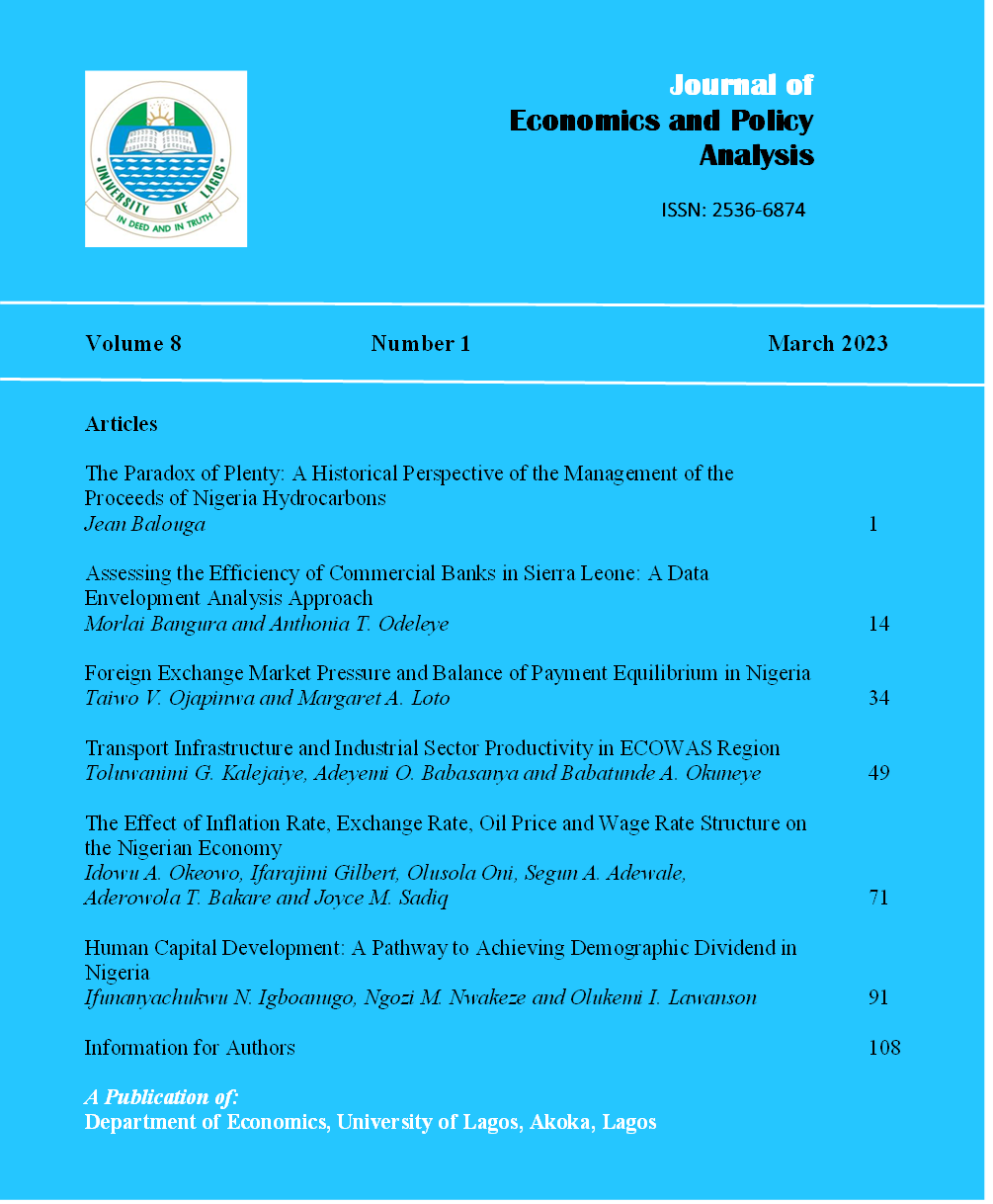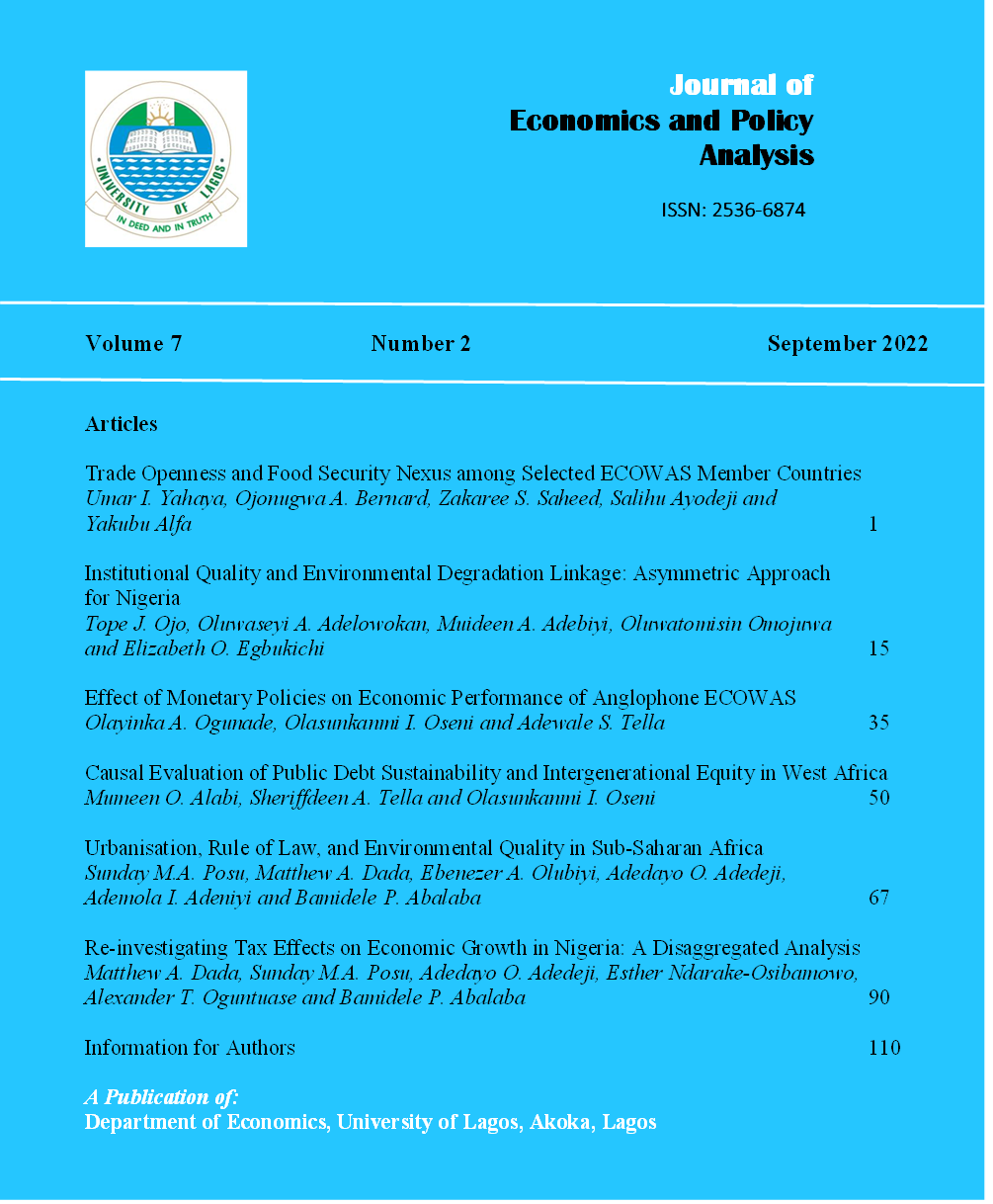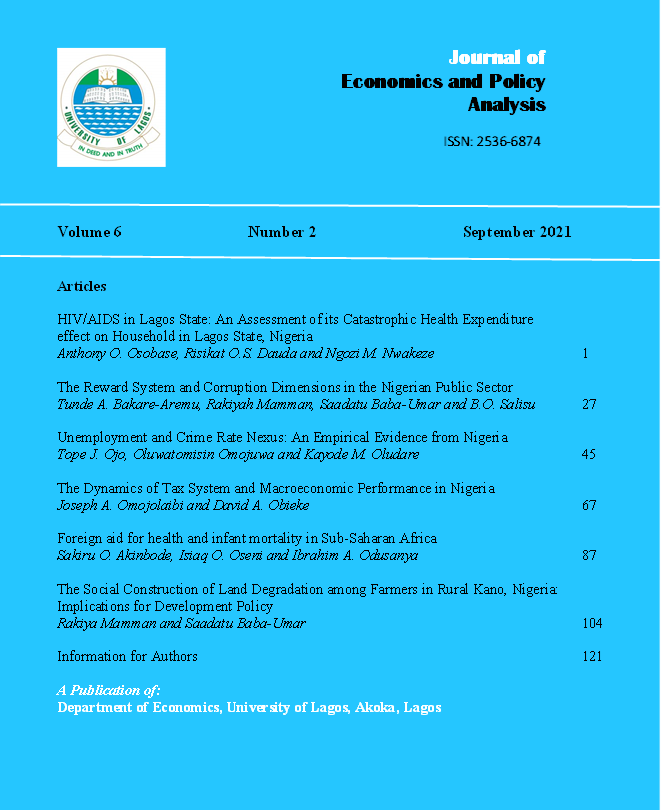-
Journal of Economics and Policy AnalysisVol 8 No 2 (2023)
The topics covered in this issue are Labour Market and Economic Growth in sub-Saharan Africa Countries; Alternative Strategy and Innovative Intervention for Street Trader Management in Lagos; The effect of Exchange Rate on Output Gap in Nigeria; Clean Energy Access, Renewable Energy Consumption and Environmental Sustainability: An Impact Analysis for Sub-Sahara African Countries.
-
 Journal of Economics and Policy Analysis
Vol 8 No 1 (2023)
Journal of Economics and Policy Analysis
Vol 8 No 1 (2023)The topics covered in this issue are The Paradox of Plenty: A Historical Perspective of the Management of the Proceeds of Nigeria Hydrocarbons; Assessing the Efficiency of Commercial Banks in Sierra Leone: A Data Envelopment Analysis Approach; Foreign Exchange Market Pressure and Balance of Payment Equilibrium in Nigeria; Transport Infrastructure and Industrial Sector Productivity in ECOWAS Region; The Effect of Inflation Rate, Exchange Rate, Oil Price and Wage Rate Structure on the Nigerian Economy; and Human Capital Development: A Pathway to Achieving Demographic Dividend in Nigeria.
-
 Journal of Economics and Policy Analysis
Vol 7 No 2 (2022)
Journal of Economics and Policy Analysis
Vol 7 No 2 (2022)The topics covered in this issue are Trade Openness and Food Security nexus among selected ECOWAS member countries; Institutional Quality and Environmental Degradation Linkage: Asymmetric Approach for Nigeria; Effect of Monetary Policies on Economic Performance of Anglophone ECOWAS; Causal Evaluation of Public Debt Sustainability and Intergenerational Equity in West Africa; Urbanisation, Rule of Law, and Environmental Quality in Sub‑Saharan Africa; Re-investigating Tax Effects on Economic Growth in Nigeria: A Disaggregated Analysis.
-
 Journal of Economics and Policy Analysis
Vol 7 No 1 (2022)
Journal of Economics and Policy Analysis
Vol 7 No 1 (2022)The topics covered in this issue are Harnessing Nigeria’s Huge Agricultural Potentials for Food Security: A Roadmap; Implication of the Rising Debt Profile and Dwindling Revenue for Nigeria’s Public Health Expenditure; Assessing the Technical Efficiency of Electricity Distribution Companies in Nigeria –The Deterministic DEA Approach; Effect of Family Business in the Promotion of Entrepreneurship Skills among the Youths in Ebonyi State; Analysis of the Impact of Microfinance on Poverty Reduction in Nigeria; and Exchange Rate and its Volatility Effects of Covid-19 Pandemic: The Nigeria Case.
-
 Journal of Economics and Policy Analysis
Vol 6 No 2 (2021)
Journal of Economics and Policy Analysis
Vol 6 No 2 (2021)The topics covered in this issue are HIV/AIDS in Lagos State: An Assessment of its Catastrophic Health Expenditure effect on Household in Lagos State, Nigeria; The Reward System and Corruption Dimensions in the Nigerian Public Sector; Unemployment and Crime Rate Nexus: An Empirical Evidence from Nigeria; The Dynamics of Tax System and Macroeconomic Performance in Nigeria; Foreign aid for health and infant mortality in Sub-Saharan Africa; The Social Construction of Land Degradation among Farmers in Rural Kano, Nigeria: Implications for Development Policy.
-
 Journal of Economics and Policy Analysis
Vol 6 No 1 (2021)
Journal of Economics and Policy Analysis
Vol 6 No 1 (2021)The topics covered in this issue are Determinants of the Demand for Primary Health Care Services in Abeokuta South Local Government, Ogun State, Nigeria; Capital Inflows and Domestic Investment in the South African Economy; An Evaluation of the Government Programme on Investing in the People: A Stakeholder’s Perspective; Population Growth, Life Expectancy and Economic Growth: A Panel Data Analysis; Explaining Nigeria's Economic Growth through the Minimum Wage Policy; and the Nexus between Defence Expenditure and Economic Performance in Nigeria.
-
 Journal of Economics and Policy Analysis
Vol 5 No 2 (2020)
Journal of Economics and Policy Analysis
Vol 5 No 2 (2020)The topics covered in this issue are Agricultural Output Financing and Poverty Level in Nigeria; Determinants of Household Cooking Energy Choice in Oyo State, Nigeria; Exchange Rate Volatility and Manufacturing Sector’s Performance in Nigeria: A Toda-Yamamoto Approach; SMEs’ Menace and Energy Deficiency in Lagos, Nigeria: Can Renewable Energy Reduce the drain?; Exchange Rate Misalignment and Insurance Industry Performance in Nigeria and Government Health Expenditure and Health Outcomes in Nigeria.
-
 Journal of Economics and Policy Analysis
Vol 5 No 1 (2020)
Journal of Economics and Policy Analysis
Vol 5 No 1 (2020)This issue considers Economic Growth Income Inequality and Poverty in Nigeria; Effect of Monetary Policy on Exchange Rate in Nigeria Examining during the Pre-and-Post Global Financial Crisis; Intra-African Trade and Competitiveness in Africa; Budget Quality and Fiscal Outcomes in Oil-Exporting Economies; examination of whether West Africa Monetary Zone is a Common Currency Area and the link between Fiscal Spending, Economic Growth and Entrepreneurship Development in Sub-Saharan Africa.
-
 Journal of Economics and Policy Analysis
Vol 2 No 2 (2017)
Journal of Economics and Policy Analysis
Vol 2 No 2 (2017)This issue addresses financial inclusion, governance and welfare analysis in Nigeria; gender and socioeconomic determinants of ownership; oil price shock and macroeconomic variables; Human capital development and sustainable development in Nigeria; worker remittance and inclusive growth; trade, capital flow and economic growth in Nigeria.
-
 Journal of Economics and Policy Analysis
Vol 1 No 2 (2016)
Journal of Economics and Policy Analysis
Vol 1 No 2 (2016)This issue focuses attention on road transport infrastructural development and poverty; exchange rate and its impact on the manufacturing sub-sector; oil price volatility and macroeconomic performance in selected African countries; Globalisation and employment in Nigeria's manufacturing sub-sector; Remittances and private consumption in Nigeria; Macroeconomic environment and domestic investment in Nigeria.
-
 Journal of Economics and Policy Analysis
Vol 1 No 1 (2016)
Journal of Economics and Policy Analysis
Vol 1 No 1 (2016)This issue addressed some lingering issues in the area of Governance and Growth; Monetary Policy and Inclusive Growth; Nigeria's Electricity Sector Reforms; Monetary Policy and Macroeconomic Shocks; Bilateral Trade Agreements and Nigeria's Capital Goods Import Demand Elasticities.
Information

